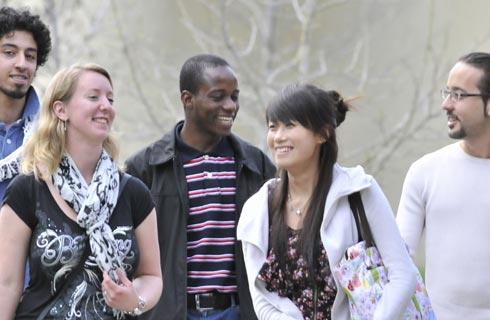国际学生入学条件
Students need to have minimum 2:2 Honours degree in any subject; We would normally expect you to have Grade C in GCSE English and Maths
展开
IDP—雅思考试联合主办方

雅思考试总分
6.5
- 雅思总分:6.5
- 托福网考总分:60
- 托福笔试总分:160
- 其他语言考试:Accepted Other English Language qualifications : Pearson PTE Academic, Trinity College London Integrated Skills in English, Cambridge IGCSE
CRICOS代码:
申请截止日期: 请与IDP联系 以获取详细信息。
课程简介
A master's degree in law is a fantastic way for law graduates to develop a specialisation or for non-lawyers working in related fields to gain a deeper understanding of legal issues. This pathway connects research in law, social science, and contemporary politics to provide you with a solid grounding in international human rights and international humanitarian law. You'll focus on responses to violations of these legal regimes through transitional justice and international criminal justice. You will learn how these issues are addressed in the context of conflict-affected countries, where human rights and international law violations often arise.You'll also have the chance to choose from a wide range of optional modules to supplement this core teaching and opt to either write a 15,000-word dissertation or conduct a work-based project that will give you valuable experience in dealing with a specific legal issue in detail.You'll develop a thorough understanding of the role of international law and human rights legislation in upholding justice in regions affected by war. This pathway takes advantage of our long-standing expertise in transitional justice and conflict, so you'll be learning about crucial, contemporary topics in the field from leading experts. You'll also be able to choose a further two optional topics from our extensive list of LLM modules. Some of the available options are also related to human rights, transitional justice, and international law, so you can develop your specialisation further, or opt to diversify your training with subjects from other areas of law.All our LLM courses are taught through a combination of lectures, seminars, and workshops. We extensively use problem-based learning, class discussion, and case studies to ensure our teaching is brought to life, while all our lectures are issued as podcasts to give you greater access to learning resources and allow you to revisit specific classes.This pathway will leave you well-prepared to pursue a career in transitional justice, international criminal justice, and human rights, in both the domestic and international sphere.Specialists may go on to work for NGOs, legal firms that specialise in transitional justice, international institutions like the UN or European Court of Human Rights, as well as non-legal professions that require expertise in law and conflict, including journalism, policy advice, and charity work.
展开







 预科
预科 奖学金
奖学金 实习机会
实习机会 在校学习
在校学习 跨境学习
跨境学习 校园授课-线上开始
校园授课-线上开始 在线/远程学习
在线/远程学习












 堪培拉大学
堪培拉大学

 悉尼科技大学
悉尼科技大学

 西悉尼大学
西悉尼大学

 阿德莱德大学
阿德莱德大学

 阿德莱德大学
阿德莱德大学

 阿德莱德大学
阿德莱德大学










